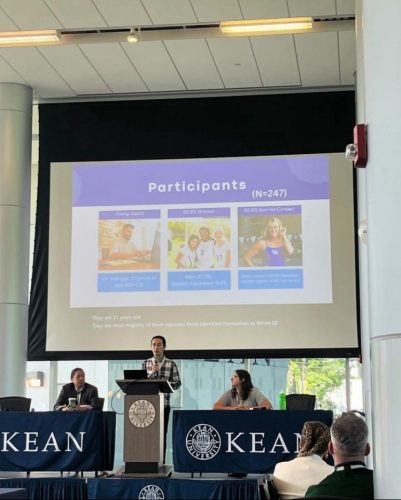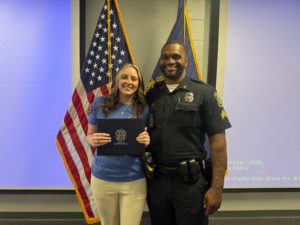UNION, N.J. – Earlier this summer, members of the University of Kentucky College of Social Work’s (CoSW) Sport Social Work Research Lab attended the Alliance of Social Workers in Sports (ASWIS) 10th Annual Symposium. Among those attendees was Ph.D. student Levone Lee, who presented his research at the symposium, marking Lee’s first solo presentation.
ASWIS has been at the forefront of integrating social work principles into sports, promoting the well-being of athletes and supporting professionals who work in the industry. Lee, a researcher in the Sport Social Work Research Lab, presented his study on examining collegiate student-athlete’s comfortability in discussing mental health.
The study focused on the preferences of student-athletes when talking about mental health issues to different social agents like their coaches, teammates, athletic trainers, and mental health professionals.
“In the past, athletes would typically go to their athletic trainers and their coaches more when discussing mental health,” Lee said. “In this study, we found that student-athletes now feel most comfortable discussing their mental health with their teammates and mental health professionals.”
This is due, in part, to new National Collegiate Athletic Association (NCAA) governance that was passed in 2022. Under the NCAA constitution adopted in January 2022, each Division I member school must facilitate an environment that reinforces physical and mental health within athletics by ensuring access to appropriate resources and open engagement with respect to physical and mental health. Because of this higher exposure to mental health professionals, student-athletes feel more comfortable talking about mental health issues with them.
Lee credits the supportive environment within the CoSW and Sport Social Work Research Lab, as well as the mentorship of Dr. Tarkington Newman, director of the Sport Social Work Research Lab, with the opportunity and platform to pursue his research and build relationships with researchers in the sport social work field.
The intersection of sports and social work has been a passion for Lee, and a unique opportunity to help focus on an athletes’ well-being on and off the playing field.
“Not only are they athletes, but they are also human beings. Their mental health matters,” Lee said. “Their mental health not only affects their performances, but it affects their lifelong happiness. If there are mental health problems that aren’t addressed, especially for young athletes, that will change the trajectory of their life and affect their overall well-being.”
As the sport social work field continues to grow, Lee’s goal is to help others understand that sport social work is important because it’s not just focused on the performance of the athlete. Social workers can help get to the root of the presenting problem, such as generalized anxiety, and address it, which may lead to improved performance.
“We are looking to find positive approaches to address mental health issues within athletes because we do research in theory, but we also want to amplify the practical applications of our research,” Lee said. “We want our research to apply to athletes in the real-world.”






